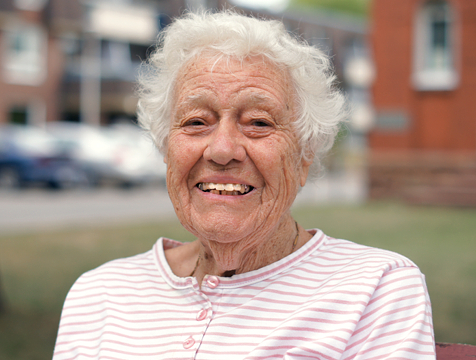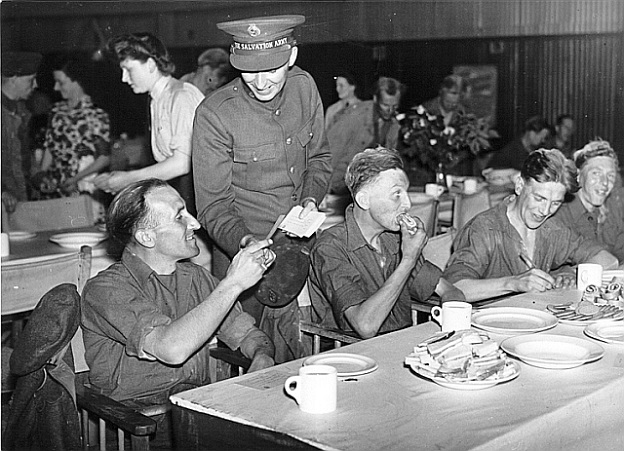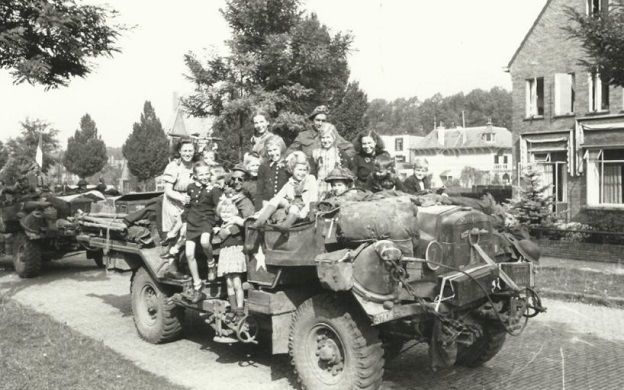Margaret’s Story

“When I see that ship in the photo, I think to myself, Did my kids and I really cross the Atlantic to Canada in a convoy, dodging enemy submarines the whole way?” says Margaret Eaton, who still vividly remembers living through the Second World War.
Margaret had never ventured too far from home, but this great and difficult journey at the age of 25 was made easier with the support of The Salvation Army, who was there for newcomers from the moment they arrived.
Love and War
Born in Rushden, England, about 100 kilometres north of London, 19-year-old Margaret met Bill Bristow, a handsome Canadian lance-corporal, at a concert in May 1940, not long after his unit, the Royal Canadian Regiment, arrived in the United Kingdom. After a whirlwind courtship, they were married that November.
When Bill was stationed in the English countryside, she followed his unit around, which often meant dodging bombing raids as she raised their two young children, Anne and John.
Margaret remembers walking along a street in Middleton On Sea in the fall of 1942, pushing Anne in her pram, when she heard sirens and saw a German plane approaching. Sheltering Anne with her own body, Margaret watched as the plane flew over.
“I remember seeing the pilot’s face, it was that low,” she says. The plane flew over and continued on, bombing a nearby Royal Air Force airfield, leaving mother and child unharmed.
“We lived through the war and the bombs and everything else,” she says. “When you’re young, you accept it because that’s the way it is.”
Journey to Canada
Margaret had promised her husband that if anything happened to him, she would head to Canada to live with his parents in Chatham, Ontario. And that summer, right after D-Day, she received a telegram indicating Bill, now a company sergeant-major with the Essex Scottish, was missing in action.
“You can’t imagine my feelings at the time,” she says now.
She later learned that he was alive and a prisoner of war, but when she tried to write him, she never received a reply.
In December 1944, the British government was making arrangements to send the wives of Canadian soldiers and their children to Canada, so with a heavy heart, Margaret made the decision to go.
She and her children spent the night at a YMCA in Liverpool before boarding the Franconia, part of a convoy bound for Canada.
“We didn’t have any assistance on-board but all us mothers helped each other care for our children,” says Margaret. “Despite our fear of being torpedoed by U-boats, we did enjoy the food on that ship! We actually ate white bread, which we had not seen in five or six years. We’d only had black or grey bread during the war.”
“What Am I Doing Here?”
Upon arrival in Halifax at Pier 21, the women and children were welcomed by The Salvation Army, the Red Cross and a number of volunteers.
“We stayed at the YWCA overnight in Halifax and were fed and very well looked after,” continues Margaret.
The following day, the women and children heading west were put on a train to Toronto. The train trip was an eye-opening experience for the newcomers.
“When I travelled through northern Quebec with mountains of snow all over, I thought to myself, What have I gotten myself into? What am I doing here?”
Fond Remembrances
Margaret’s involvement with The Salvation Army at this point was just beginning. After arriving in Chatham and settling in with her husband’s family, her mother-in-law took her to The Salvation Army Home League to help her meet new people and gain support.
“The Home League was a women’s social group. We had a lot of activities including crafts and games,” she says. “It was a completely different life in Canada, but we quickly got used to it.”
Margaret says that The Salvation Army not only helped her through some difficult times but also assisted her husband and other soldiers during the war.
“The Salvation Army provided them with all sorts of things, such as food and warm socks, and never asked for anything in return,” she recalls.
Bill returned to Canada in August 1945 and they lived in Chatham until 1953 when his factory job was moved to Gananoque, Ontario. Margaret continued to be a part of The Salvation Army Home League in her new community.
Bill passed away in 1965, but Margaret continued to volunteer her time at The Salvation Army Thrift Store, not to mention other organizations over a span of years.
Now 93, Margaret still volunteers where she is able. In addition, she finds time to visit schoolchildren to speak about her experiences during the war and share with them the sacrifices young soldiers made for their country.
The Salvation Army marked her outstanding work with a volunteer appreciation award this past spring.
“I’ll always remember what The Salvation Army did for me and my family,” says Margaret. “It’s a very special organization.”
By Caroline Franks
Photo: Brandon Laird




